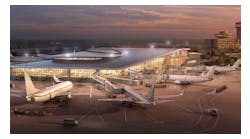Brad Sucher, AIA, NCARB, became one of the youngest partners at Gresham Smith when he was promoted to senior architect. He has led some of the firm’s most expansive airport modernization and expansion projects. While at Gresham Smith, he has taken a significant leadership role in the firm’s work at Fort Lauderdale – Hollywood International Airport (FLL), which has spanned more than eight years and included more than $1 billion in construction.
More recently, Sucher has been leading Gresham Smith’s terminal modernization and renovation at Asheville Regional Airport, a project that includes a complete rebrand requiring extensive public engagement and will double the airport’s size with a vertical expansion.
“When I was studying architecture in college, I always was most intrigued by large public space,” he said. “This was one of the draws that led me to Gresham Smith and getting engaged with aviation.”
Sucher said he appreciates the uniqueness of every airport and the different challenges they pose.
“Even though there are some overarching principals that help define how an airport should function, finding the right blend and how to apply them to each different application is a fun challenge,” he said. “Another aspect that I enjoy about aviation is the planning aspect and being able to extrapolate the effects of peak hours passengers or the effect of a peak month surge on an airport. With a variety of new technology now on the market and in the process of being implemented, having the ability to capture real-time passenger data at something like a checkpoint or baggage claim allows a more accurate understanding of passenger flow and more accurate space planning.”
Outside of the office, Sucher is a member of the American Association of Airport Executives Young Professionals Society, which has enabled him to serve as the track host at the AAAE/ACC design symposium and mentor students from Hampton University. While earning his Master of Architecture degree from the University of Detroit, Sucher worked at the Detroit Collaborative Design Center, a non-profit organization that works with neighborhood partners on high-quality community-engaged design projects across the city.




